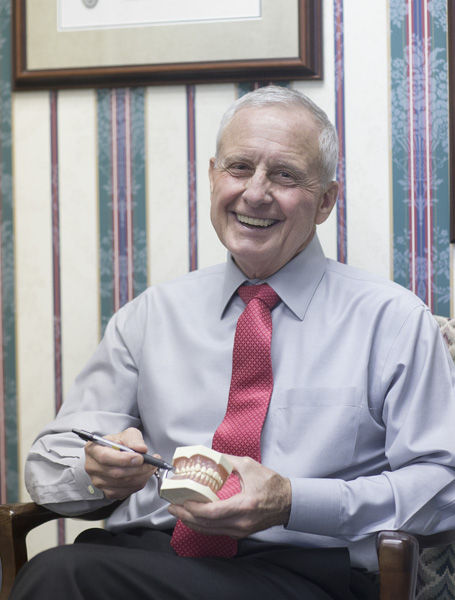Just 30 years ago, about half of all people age 65 or older had no remaining natural teeth left; that number is now closer to one-quarter, so it has significantly declined.
So it is good news that people are keeping their natural teeth much longer than they used to. Advancements in dental technology are a big reason for the improvement, although much more can be done if dentists and patients work together to take better advantage of the new technologies, says Dr. Ben Emerson of the Emerson Center for Oral Health in Vero Beach.
“Teeth are intended to last a lifetime, in health, function, and comfort,” says Emerson, who holds both MD and dentistry degrees.
It is unfortunate that many people still dread having to go to the dentist and that such anxiety keeps them from having regular checkups.
Some of the more popular recent technologies, says Emerson, actually serve the purpose of making a visit to the dentist more comfortable and less anxiety-inducing, thus potentially resulting in more regular visits.
Here are some of the newer techniques that can help reduce pain and discomfort in needed dental treatments.
Air-abrasion is an alternative to drilling for the treatment of small cavities. It removes decay by blasting decay with pellets containing air and aluminum oxide.
Desensitizers are good for those with sensitive teeth. A drop is applied before treatment and can be used alone or with other pain relief methods.
Digital X-rays capture dental images through a sensor; images are processed onto a computer screen. They are more comfortable for patients than traditional X-rays and reduce exposure to radiation.
Lasers use light energy as their method of operation, which makes the recovery period shorter and virtually pain-free. Among other conditions, lasers are used to treat benign tumors, cold sores, and nerve damage.
All that said, for Emerson the most exciting advancement in dentistry is the ability to regenerate bone. “The bone’s function is to hold teeth and when teeth are lost, the bone atrophies. Regeneration of bone allows for dental implants, which are attached to the jaw bone and are a good alternative to dentures,” he says.
Implants fit more snugly, resulting in the ability to eat a wider array of food and, ultimately, better nutrition and health for the patient. This is an especially good outcome, as poor nutrition is a real problem in older adults.
While keeping natural teeth is a welcomed trend, it does make consistent oral health care all that more important as we age, to help prevent problems commonly seen in the older population.
Those problems include:
Periodontal (gum) disease is, according to Emerson, the most common disease for people over 40. “It is caused by bacterial plaque; sugared drinks and starchy foods lead to the growth of bacteria, especially when consumed frequently and left on the teeth,” he notes. Any bleeding while brushing teeth is a sign of inflammation (gingivitis) and a cause for concern. Left untreated, the supporting tissues that hold the teeth in place can be destroyed, resulting in tooth loss.
Acid erosion. As with gum disease, the culprits here are sugars and starches. They ferment, and the bacteria in the mouth produce acids, which can eat away at tooth enamel. Tiny pits are created, in which tooth decay can form.
Root decay starts with gum tissues receding from the tooth, exposing the root. Cavities can then form, which get big much faster than on the surface of the tooth, due to the fact that the root does not have protective hard enamel. These cavities can then spread to the inside of the tooth, hit the nerve, and cause a toothache or an infection. In extreme cases, the cavity can cause the tooth to break off, leaving just the root.
Denture-sore mouth is the mild inflammation of tissue beneath a denture. It is more common when a full upper denture is worn and left constantly in the mouth. The condition is usually harmless, but may be more of a concern for people with a compromised immune system.
The good news, according to Emerson, is that dental disease is totally preventable. “The mental process used to be ‘my parents lost their teeth, so I will too’. But that doesn’t have to be the case. Educating patients about prevention is a big part of what dentists and hygienists do,” he says.
Emerson notes, not surprisingly, that regular brushing and flossing are essential preventative measures. There are others:
Special toothpastes, gels, and rinses can be prescribed by dentists for their patients who are at high risk for dental disease. These products often contain high fluoride or anti-bacterial agents.
Regular dentist visits for teeth cleaning or denture refitting. Apart from normal dental hygiene, other problems are involved, too. Missing teeth or ill-fitting dentures can lead to aspiration of food, a cause of pneumonia.
Keep on top of other health conditions. In recent years, there has been increased interest in links between oral health and body health. For instance, inflammation associated with gum disease can cause problems in other parts of the body.
One other important preventive message from Emerson: “Sometimes people aren’t motivated to brush properly or as frequently as they should. It’s a good idea to ask someone to be their coach, to remind and encourage them.”

